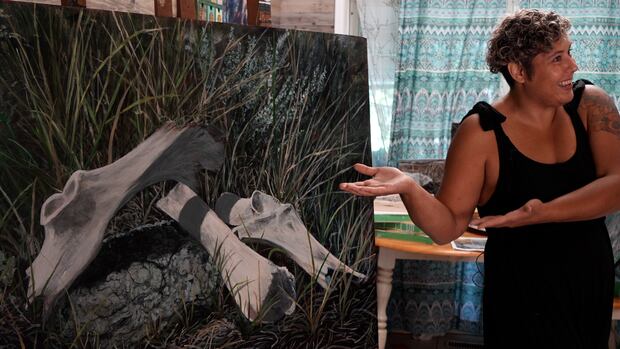Dropping knowledge: Sask artist's upcoming exhibit uses cow manure to make a point
Bullshit, an exhibit by Jamie Reynolds, set to open at Estevan Art Gallery on Sept. 6

When Jamie Reynolds started taking photographs of cow manure, she didn't imagine she would be opening an exhibit inspired by it.
Now her show, which she is calling Bullshit, is opening at the Estevan Art Gallery on Sept. 6.
The exhibit features paintings based on pictures of cow manure that Reynolds captured in provincial and national parks around Saskatchewan.
Reynolds lives in Regina, but is originally from Pasqua First Nation in Saskatchewan.
She said she and her family were visiting Grasslands National Park and noticed cow patties all over the area.
Her daughter pointed out it would be fun and silly to take photographs of the generous gifts the cows left behind.
What started silly turned into something more serious. Reynolds wanted to know why there was so much cow dung all over the land. She said a parks rep explained there was a pilot project underway that allowed nearby ranchers to graze their cattle in the park.
Reynolds said she was told the park wanted to emulate the time when bison walked the lands and helped fertilize them.
"I started to feel like this is kind of bullshit," said Reynolds
Reynolds said cows and bison are nothing alike. She said bison were there naturally until hunted to near-extinction. If anything, bison should be brought back, she said.
"You've got this sort of artificial solution to a natural problem that they created in a park, which is supposed to be like a naturally preserved area, but it's artificially preserved," Reynolds said.
She said the more she started learning about the parks and the history of ranchers using Crown lands, the more upset she got.

Reynolds said it made sense to use her new knowledge in a show. She said it's a way to talk about the history that she learned, and about the different ways the land is being affected by these animals.
She acknowledged that basing it around poo is tongue-in-cheek, but said it's also a good metaphor.
"I just thought it would be kind of funny to fill a gallery space, which is normally a sort of high-art and respected area, with literal shit," she said.
Reynolds said gallery staff were apprehensive at first, but the more that she talked to them about it, the more interested they became.
"I've gotten really good support for it and it's been fun." said Reynolds

Reynolds said she tried to bring out the drama — and the beauty — in the images.
"My intention with how I made the paintings was to elevate the poop and sort of make it an object of beauty and really just highlight it in a very dramatic way," Reynolds said.
She said poo is part of the environment.
"It's got so many different uses that we should really be appreciating it more."
Asked about the grazing program at Grasslands National Park, spokesperson Lisa Leuty directed CBC to information on the park's website.
It states that bison do graze in some areas of the park, but require a more robust style of fencing than cattle. Also, bison are not the best option for certain objectives, like intensive grazing to control invasive species it says.


